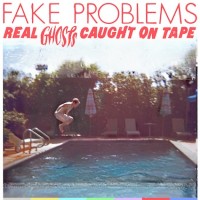
Fake Problems
Real Ghosts Caught on Tape (2010)
Richard Verducci
If I can indulge for a second, I had the privilege of getting to sit with Fake Problems while they were listening to some rough mixes from their newly recorded Real Ghosts Caught on Tape back in June. After listening to a couple of tracks I was asked what I thought. With a bit of weight in my heart I replied, "It's good, but it better gain you a fan for every one you're going to lose." I could instantly tell it's not what the band wanted to hear. However, after receiving the final product and listening to it on repeat for several days, it's an assessment I still stand by.
To be clear, this doesn't mean that Real Ghosts is a bad album--quite the opposite. In many ways, this album features some of the strongest material Fake Problems has created to date. Vocalist/guitarist Chris Farren demonstrates some of his strongest lyrics and accompanying vocals. Farren has always been at his best when he takes his personal experiences and expands on them to make larger points than just a personal story (something I felt was missing in the band's full-length debut, How Far Our Bodies Go). This skill is highlighted in tracks like "Songs for Teenagers," which could easily be the soundtrack to so many wasted nights and hungover reflections.
Not to be outdone by their frontman, the rest of the band has stepped up their game musically. While Casey Lee has always been a standout guitarist, he really impresses on this album, not by becoming more prominent but by taking his skilled and ever-moving guitar style and working it seamlessly into each song. Additionally, there seems to be a playfulness between Lee and drummer Sean Stevenson on certain tracks. The intertwining in tracks like "Complaint Dept." or "Done with Fun" highlight that the band has done more than developed as talented musicians but as a single, cohesive band.
That said, Real Ghosts isn't going to be for everyone. More specifically, it may not be for fans of Fake Problems' previous work. The album lacks all traces of the folk-punk that initially snagged listeners in Spurs and Spokes / Bull > Matador or How Far Our Bodies Go. In its place is a much smoother brand of rock that borders on pop. However, this isn't totally unexpected, as the album was produced under the watchful eye of Ted Hutt--a man who is known for taking bands with a more punk edge and polishing them into pure rock gems (the Gaslight Anthem, Lucero, Chuck Ragan, etc.). Additionally, Real Ghosts lacks the intensely expanded instrumentation of It's Great to Be Alive. Sure, there's a tambourine here and there, a few handclaps and backup harmonies--but nothing like the cacophony of "Level with the Devil" or the full horn section of "Don't Worry Baby." The sound is far more pared back, highlighting the band's ability to play live more than the ability to record a huge album.
Perhaps the biggest thing going against the album is the timing. Entering October we are in full autumn mode, buying jackets, bundling up and preparing for a war-like midterm election (in America at least). In the midst of all this freezing weather and anger, Fake Problems have put together a record that sounds like it should produce unicorns that vomit rainbows. Rainbows that would turn into rivers that would flow through your city and cure the illnesses of all they touch. Sure, there's more melancholy and brooding tracks (the previously mentioned "Songs for Teenagers" or "Ghost to Coast"), but even tracks that tackle deeply personal subject matter have such a fun and poppy melody that you can't help but tap your foot and bob your head. This is a great summer album (and who could blame the band--it was recorded over the summer in Los Angeles while they all lived at a house with a pool…it's like Jersey Shore) that is being released in the depth of autumn. So, I can't help but think there may be a few more people picking this album up once the ice starts to melt after winter.
So, what do you have with Real Ghosts Caught on Tape? It's a great album that is very different than any of the band's other endeavors. So different that it does run the risk of alienating some of the band's previous fans. However, it would be shortsighted to say that this change is a negative thing. Fake Problems have always been a band whose tastes have changed faster than many of their listeners (just check out their split with Sedona). However, for those who stick with the band, the journey from album to album is bound to be an interesting one, even if it's one that is surprising and even confusing at times, and in a world where so many bands seem to just go through the album cycle, isn't that worth something?